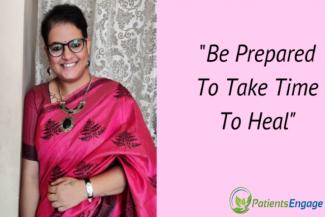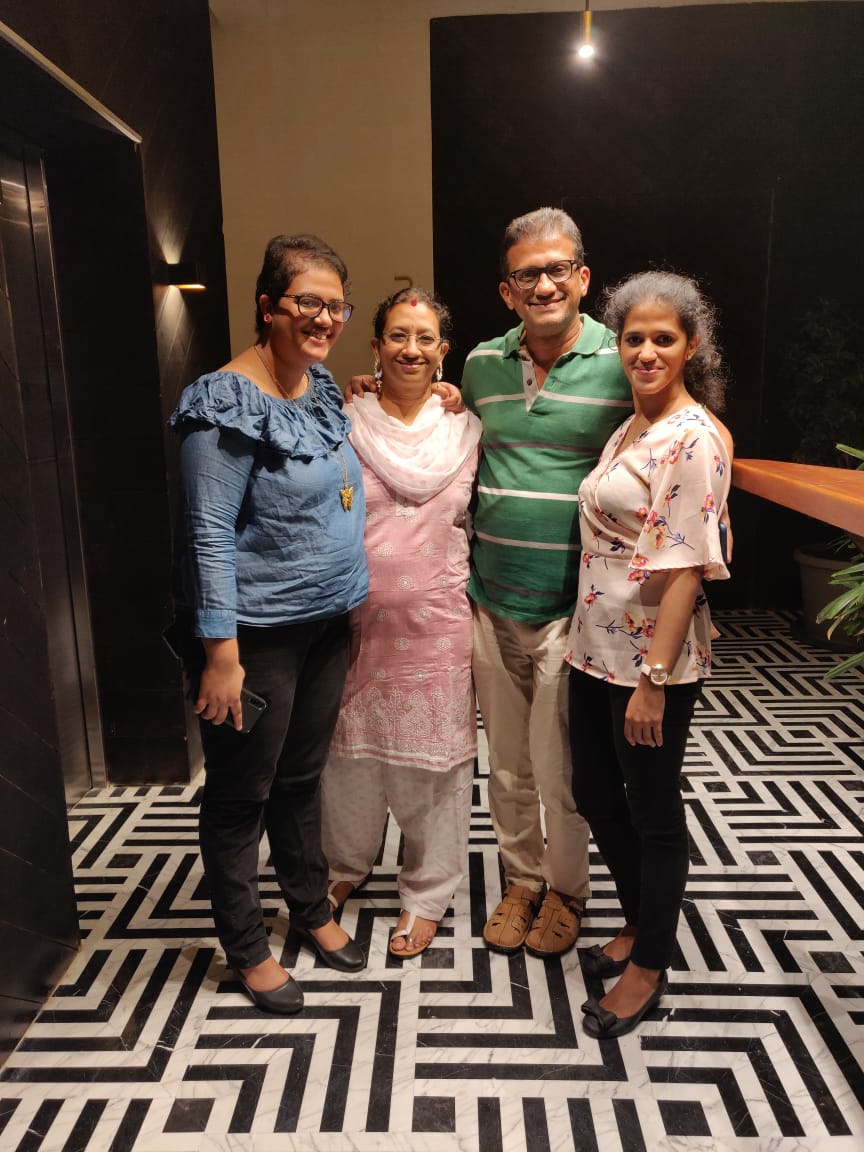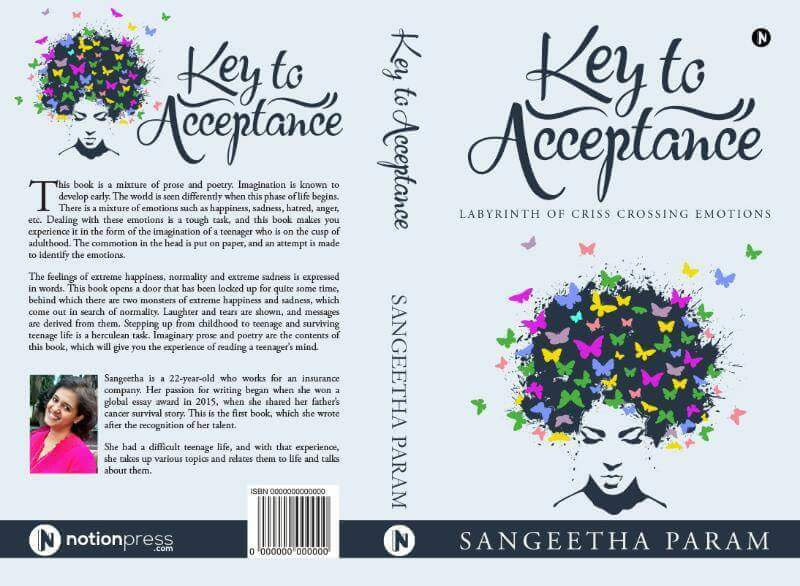
Sangeetha Param, 26 a mental health advocate continues to deal with depression, bipolar disorder, borderline personality disorder and has survived suicide attempts. She talks about her relapses and her inner struggles to stay afloat. She is also a motivational speaker.
**Trigger Warning - reference to self harm**
Sangeetha Param had previously shared her journey from diagnosis to mental health advocate here
How did the latest relapse begin? Was it sudden or gradual?
The relapse began in the first week of January 2021. I was diagnosed in November 2014, with Bipolar Disorder and Borderline Personality Disorder after my first suicide attempt. On diagnosis, I breathed a sigh of relief as I did not look at the diagnosis as a tagline or a weakness but realized that there are many people in the world diagnosed for the same, there were books written and research being held on the same.
Over the years I have tried to identify my symptoms of mania and depression early and manage them as health issues.
The sudden rush of energy, willingness to take up projects, loss of sleep, impulsiveness are the signs that I noted at onset of hypomania and accordingly became aware of my actions and behavior. I sought the help of my inner circle by informing them about my mental health state and letting them help me ease through the phase.
The feeling of loneliness, melancholy, sadness, negativity, eating habits are some of the signs I observe as onset of depression.
This January 2021, the depression set in slow. I was holding myself well after a break-up during October 2020 by being functional and being regular to work and was having regular therapy with medications. But, as the days passed and February arrived, my functionality and will to live reduced drastically.
I hurt myself on February 18th after 1.5 years of having stayed clear of self-harm addiction. I knew I had hit rock bottom.
How did you feel about it? Especially since you have learned to manage your condition
Every depression episode is different. One cannot predict when or what will cause depression and how it will manifest. This time it was a bad one for a long period with me being dysfunctional, not going to work, loss of appetite, and disassociation with the world. But, I am proud that I did not seek immediate relief and medical intervention and waited for the phase to pass.
It has just been a couple of weeks since I reported back to work after 1 month of leave and I am taking it slow, one step at a time. I am not rushing to heal or recover, instead, I am working towards it slowly. I do not plan out the whole day as it creates pressure. I take one hour and go slow on my work. When I feel stressed I go for a walk, take sips of water, and become aware of my surroundings.
Healing takes time, especially when the wound is deep. I am giving myself enough time to heal and I want to work with the right methods.
Have you had previous depressive episodes? What were the approaches that worked before?
Yes, many times.
On being diagnosed with Bipolar Disorder Type 2, I have more lows than highs. Over the past 6 years, I have been admitted to a medical institution and administered ECT (Shock Therapy) and drugs to ease out the depression. Admissions have been thrice over the past 6 years but the episodes of lows have been there countless times with a few manic and hypomanic ones. I have attempted suicide 4 times and I overdosed on pills all 4 times.
It was more of desperation to have serotonin and dopamine running through my veins and less of cortisol so I chose the the route of medications and ECT rather than working on the core issues which involved me putting in more effort.
I now feel that these are temporary solutions that restore mental health for a short period. But I decided I could not always call every episode of depression a medical emergency and let my desperation for happy hormones take over natural means of healing and stop me from exerting effort to heal the normal way.
What was your approach this time?
This time I had a different approach. I did not rush to a medical facility for admission like I usually do in desperation to feel better; instead, I let the pain ease out. I rested until I was confident to get-up. I appreciated and rewarded myself for small victories and efforts; as small as taking a shower, eating on time, attending group therapy, etc.
I let myself feel the pain and I vented by crying. I faced my fears slowly. I am not completely healed, but I am working towards it by taking baby steps.
Why did you decide to treat it differently this time?
To be honest, I could not get admitted due to the Covid-19 situation and the pandemic, but it turned out to be a blessing as I could work on myself this time. I always chose the easy way out but this time I had to put the 50% effort and a combination of medication and therapy did the rest. A prescribed combination of anti-anxiety and anti-depressant medicines helped me a lot. It helped me sleep and get a good night’s rest which resulted in me waking up less groggy.
It was high time I started working on my mental health. They say, ‘Unless you put the effort you won’t know.’ It is a very true statement. Facing my depression, the pain, the trauma by addressing the core issues helped me deal with the depression better.
I am 26 years old. I spent one month in bed dysfunctional while a normal 26 years old would have had so much to do in this 1 month, like go on dates, meet friends, travel, shop, volunteer, watch movies and TV shows, learn a new skill, so on. I could have done so much, I am not guilty that I spent one month in bed. I was in hibernation as my mind needed healing. I need to invest a little more time for healing than other “Normal People” in society as I have a diagnosis and we invest a lot more in everything through our emotions which drain our emotional energy.
We need to re-kindle and connect with ourselves and it takes us a little more time and effort and I want to heal, make a difference. I have a diagnosis. I will have to face the setbacks of it but I can learn to deal with the setbacks in a much healthier way so that the impact is not too much and the result isn’t too damaging.
Tell us about your work with your counselor/ therapist?
I started my work with a new therapist in December 2020.
Being under medication of 11 pills per day for about 5 years, in March 2020 I gradually tapered the dosage. My physical health had also started getting affected as my menstrual cycles were irregular. I reached a place of stability with two medications per day with a new team of psychiatrists and psychologists and began therapy and medication management.
I opened up to my therapist by keeping goals. I wanted to deal with core issues and I was very particular that my target was dealing with the core issues that would help me become a better person and that is how I worked with my therapist towards my goal.
How did you prepare your family to support you in your changed approach?
My family is my inner circle. My therapist had an open discussion with my family and informed them about my mental condition that I was undergoing post-traumatic stress and I needed time to heal. They were asked to provide me a safe space.
I was also informed that in a family setting there are other people involved. My family, consisting of my father, Mr. P S Parameswaran, my mother, Mrs. H Ramalakshmi, my sister, Ms. Swetha Param, and my two kittens, Chots and Ramu, their feelings are also to be considered.
Just because I was having a tough time, it did not give me the right to expect my inner circle to stop their lives or drag them into my merry-go-round of sadness. I was instructed to respect and consider their feelings and emotions too. In a family setting there would be many things that would trigger me but to take it slowly and not personalize it.
My family and I took this phase as a testing time which only brought us closer than before.

Learning from this experience
- Befriend your depression, fears, pains, and trauma. Do not run away from them as the demons will only get more power and chase you. Face them with ease.
- Don’t become desperate to heal. Take your time to process your feelings. It is okay to be vulnerable for some time but only you can help yourself. I know this statement seems harsh, but it is a fact. We will not have any willpower or motivation to do anything during the depression but just breathing and surviving, doing basic things would suffice. That also requires effort and you have all the right to appreciate and reward yourself for your efforts. Small or big, you made the effort.
- It seems unfair that everybody’s lives seem picture-perfect while you are stuck in circles of depression and mania, but our self-awareness helps us deal with our emotions and makes us more empathetic towards others which gives us a positive strike.
- Your inner circle matters as they are the ones who have your back.
- Feeling suicidal, wanting to self-harm doesn’t make you a freak, it makes you a person who is aware of what you feel, but it is up to you how you deal with those feelings, what you want to do with your insecurities, how are you going to change those negative thoughts and convert your mistakes into lessons.
- Depression may seem like the worst thing that might have happened to you and it is a fact that depression is something that will always be a part of you, but how you are going to deal with it, makes every depressive episode a learning experience and makes you look at it as a new challenge, a new peak to trek and mark your territory.
- Hoist your flag and conquer your fears and build your kingdom by constructing forts of victory against every obstacle and challenge.
Books:
2) Echoes in my Attic
Tedx Links:
1) TEDx SMIT (October 2018)- https://youtu.be/5fArkGKdfYo
2) TEDx SIT (January 2019)- https://youtu.be/6AJGc-6Ai1I







